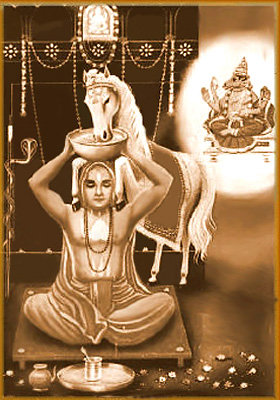 Vadirajatirtha (1480 - 1600) was one of the greatest scholars as well as a saint India has witnessed. Shivalli Tulu Brahmin who was also a great poet as well. He belonged to the village of Hoovinakere of Udupi district of Karnataka. Ramacharya and Gauri were his parents. He is next to Srimad Ananda Tirtha, though his guru was Sri Vyasatirtha. He was also very effective in the administration of the Udupi Matha system. Many changes were made in the operational system of the Matha which proved his high placing in the Madhva hierarchy.
Vadirajatirtha (1480 - 1600) was one of the greatest scholars as well as a saint India has witnessed. Shivalli Tulu Brahmin who was also a great poet as well. He belonged to the village of Hoovinakere of Udupi district of Karnataka. Ramacharya and Gauri were his parents. He is next to Srimad Ananda Tirtha, though his guru was Sri Vyasatirtha. He was also very effective in the administration of the Udupi Matha system. Many changes were made in the operational system of the Matha which proved his high placing in the Madhva hierarchy.
At a young age he became a Sanyasi. Before he becoming a sanyasi his name was Bhuvaraha. Lord Vishnu was worshipped by him in the form of Hayagriva. He had changed the Paryaya system of Udupi to two years from the practice of 2 months. This enabled the Swamis to travel far in order to spread the message of Madhva tradition. He performed Lord Krishna`s Paryaya at Udupi five times.
Vadirajatirtha took the haridasa tradition to the masses through translation of major works into the Kannada language. He explained difficult concepts through simple stotras.
Works of Vadirajatirtha
Yukti-Mallika (logical analysis of different philosophical systems) is his masterpiece which has five Chapters called Sourabhas. Mahabharata-Prasthana (view of Mahabharata) is also known as Mahabharata Lakshalankara. It is an explanation of hundred thousand difficult words of the epic Mahabharata. Mahabharata-tatparya-Nirnaya (commentary on work authored by Srimad Ananda tirtha) is another work with a Kannada translation. Rukminisha-Vijaya (narration of an encounter between Krishna and Shisupala) is a mahakavya which was written to exceed Maga`s Shishupala Vada. Svapna-Vrndavanakhyana is a sort of auto-biography. Sarasa Bharati Vilasa is regarding the svarupa`s of Lakshmi, Brahma and Saraswati. Sruti Tattva Prakashika is an explanation of some important verses of Veda.
His other works are Sri Nyayaratnavali, Thirtha prabandha, Sri Hari Bhaktilata, Sri Pasandamatakamdanam, Sri Vivaranarnavam, Sri Upanyasa Ratnamala, Kavi Kadamba Kanta bhushana, Talavakaropanishad Bhashya Teeka, Taittareeyopanishad Bhashya Teeka, Kathakopanishad Bhashya Teeka, Atharvanopanishad Bhashya Teeka, Mandookopanishad Bhashya Teeka, Tantra Saara Teeka, Shatprashnopanishad Bhashya Teeka Tippani, Mahabharatha Tatparya Nirnaya Bhavaprakashika, Ishavasyopanishad Bhashya Teeka Prakashana, Geethabhashya Tippani, Vaikuntavarnane and Gundakriye.
Sub-commentaries have also been written on Sri Jayatirtha`s Nyayasudha and Tattvaprakasika called "Gurvarthadipika". Sub commentary has been composed on Isavasya Upanishad Tika.
The stotras composed by him are: Ramesha Stuthi, Dashavataara Stotra, Dashavataara Stuti, Hayavadana Astaka, Narahari Astaka, Roupya Peetha Krishna Stuthi, Hayavadana Astaka, Hayagreeva Panchaka, Hayagreeva Dhyana Prakarana, Hayagreeva Stuthi, Hayagreeva Sampada Stotra, Sri Krishna Stavana, Dhee Shuddhi Stotra, Varaha Hayavadana Stotra, Aapada Stotram, Ukti Pratyukthi stotram, Aksha Panchakam, Varaha Panchakam, Sri Raama Kavacham, Sri Raama Dashakam, Sri Raama Panchakam, Avataara Traya Stotram, Swapna Padyam, Lakshmi Shobhane, Kannada Hadugalu, Tulu Hadugalu, Bhogola Varnane.









